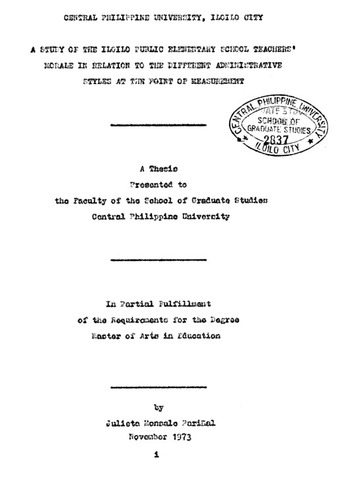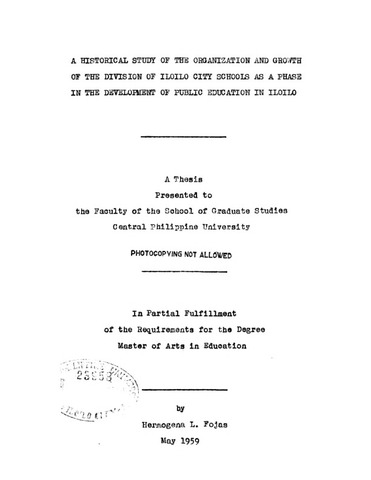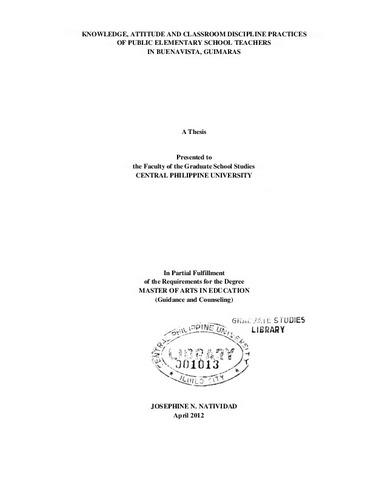A study of the Iloilo public elementary school teachers' morale in relation to the different administrative styles at the point of measurement
| dc.contributor.adviser | Ruiz, Macario B. | |
| dc.contributor.author | Pariñal, Julieta Monsale | |
| dc.coverage.spatial | Iloilo | en_US |
| dc.date.accessioned | 2021-10-01T07:38:51Z | |
| dc.date.available | 2021-10-01T07:38:51Z | |
| dc.date.issued | 1973 | |
| dc.identifier.citation | Pariñal, J. M. (1973). A study of the Iloilo public elementary school teachers' morale in relation to the different administrative styles at the point of measurement (Unpublished Master’s thesis). Central Philippine University, Jaro, Iloilo City. | en_US |
| dc.identifier.uri | https://hdl.handle.net/20.500.12852/1464 | |
| dc.description | Abstract only | en_US |
| dc.description.abstract | This is a study conducted by one of the two members of the team working on the separate problems on the teacher morale. The objective of this study was to: 1. Determine, if any, the agreement of the administrators' self-evaluation with their respective teachers' judgments as to the administrative styles used by the administrator. 2. Identify the prevalent administrative leadership style of the public elementary school administrators in the first and fourth congressional districts in the province of Iloilo. 3. Ascertain the type of administrative leadership styles used by the school administrators in relation to the different major elements of the administrative process and the interpersonal relationship. 4. Find out the relation of the Iloilo Public Elementary school teachers' morale to the different administrative styles used by the public elementary school administrators. The investigator used the normative survey in determining the typical administrative leadership practices. The sample administrators were 115 public elementary school head teachers and principals. From each of the 115 participants schools, the majority of the teachers was determined to judge the administrative styles used by the 115 administrators. A total of 680 teachers constituted the sample: forty-six teachers were under the autocratic administrators, 596 teachers were under the democratic, and thirty-eight were under the laissez-faire. The leadership behavior traits and administrative practices of administrators were listed in the preliminary survey questionnaire to be evaluated by the professors. The same traits and practices were used in Section II of the questionnaires for the administrators and the teachers. The two survey instruments for this study and the questionnaire prepared by the other member of the team were distributed personally to each of the respondents. The majority of the teachers under one administrator was used to judge the administrative style of that administrator. The responses of the majority of the teachers to the anchor item were made the basis for determining the number of autocratic, democratic, or laissez-faire administrators. Chi-square at 5 per cent level was used to test the significance of the divergence of the administrators' self-evaluation and the teachers' judgment of the administrative style of the school administrators. Analysis of variance was used to determine the significance of the mean differences of the morale scores. An intra-class Correlation was computed for a factor whose mean was significant, in order to discover how much of the variances in morale is due to the factor yielding the highest mean. This study revealed that: 1. There is an agreement of the administrators' self-evaluation with their teachers' judgment as to the type of administrative style used by the administrator. 2. The prevalent administrative style of the school administrators in the first and fourth congressional districts was decidedly democratic. There were nine autocratic administrators, ninety-eight democratic, and six laissez-faire. 3. Democratic leadership style was used by the school administrators in relation to the elements of the administrative process and the interpersonal relationship. 4. The morale of the public elementary grade teachers in two congressional districts involved in the study is not associated with the administrators' administrative leadership styles. The morale of the teachers as a group under the democratic administrators is not higher than the morale of teachers under either of the two types of administrators. Morale as measured in terms of the composite of the six factors is not associated with the administrative styles; however, it is associated with interpersonal relationship. On the basis of the findings of this investigation under the condition in which it was conducted, the following conclusions were arrived at: 1. There was a higher agreement of the administrators' self-evaluation with their teachers' judgment as to the type of administrative style used by the administrators. 2. Democratic administrative leadership style was the prevalent style used by the public elementary school administrators in the first and fourth congressional districts of Iloilo. 3. Democratic administrative leadership style was used by the administrators in relation to the major elements of the administrative process and interpersonal relationship. 4. The morale of the elementary grade teachers in both congressional districts studied is not associated with the administrators' administrative styles. As a group, the morale of the teachers under the democratic administrators is not higher than the morale of the teachers in either of the autocratic or laissez-faire administrator. Morale as measured in terms of the composite of the six factors is not associated. With the administrative style; however, it is associated with interpersonal relationship. As a result of this study, the following recommendations are presented: 1. Courses in human relationship be offered in colleges and universities for graduate as well as undergraduate students preparing for employment involving human interaction. 2. Seminars in interpersonal relationship and human interaction be provided both the teachers and the administrators in the field in order to develop and/or maintain teacher morale. 3. The school administrators should be transactional: he can be autocratic, democratic, or laissez-faire depending on the demands of the situation and the personality needs of the teacher. 4. A similar study is hereby recommended to find out what factors, in the context of the Filipino culture, affect teacher morale aside from interpersonal relationship. | en_US |
| dc.format.extent | xix, 229 leaves | en_US |
| dc.language.iso | en | en_US |
| dc.subject.ddc | GSL Theses 378.242 P217 | en_US |
| dc.subject.lcsh | Elementary school teachers | en_US |
| dc.subject.lcsh | Teacher morale | en_US |
| dc.subject.lcsh | School management and organization | en_US |
| dc.subject.lcsh | Elementary schools--Management | en_US |
| dc.subject.lcsh | School administrators | en_US |
| dc.subject.lcsh | School administrators--Rating of | en_US |
| dc.subject.lcsh | Educational leadership | en_US |
| dc.subject.lcsh | Teacher-principal relationships | en_US |
| dc.subject.lcsh | Philippines--Iloilo (Province) | en_US |
| dc.subject.lcsh | Employee morale | en_US |
| dc.title | A study of the Iloilo public elementary school teachers' morale in relation to the different administrative styles at the point of measurement | en_US |
| dc.type | Thesis | en_US |
| dc.description.bibliographicalreferences | Includes bibliographical references | en_US |
| dc.contributor.chair | Herradura, Elma S. | |
| dc.contributor.committeemember | Espada, Wilfredo G. | |
| dc.contributor.committeemember | Tupaz, Loreto D. | |
| dc.contributor.committeemember | Griño, Eliza U. | |
| dc.contributor.department | School of Graduate Studies | en_US |
| dc.description.degree | Master of Arts in Education | en_US |
| local.relation.associatedcontent | https://repository.cpu.edu.ph/handle/20.500.12852/2123 Journal article published in Southeast Asia Journal | en |





